
The aim of this lesson is to teach eCommerce copywriters how to create a Privacy Policy for online stores with the help of hand-picked examples, templates, and handy tools.
A good Privacy Policy has to:
- Clearly state the store’s intentions
- Be personalized, and
- Promote transparency
OK. But what is it actually? Let’s see…
What Is a Privacy Policy and Why It Matters
A Privacy Policy is a statement or a document included mostly at the website’s footer to give information about how the business owners collect and use the confidential and sensitive information they got from customers, clients, visitors who visit or make transactions on their sites.
It is one of the most important documents for eCommerce store owners as this promotes transparency. People would want to know where and how their information is being used and if it’s being kept confidential. They are now very keen on selecting websites that value confidentiality and websites that they can trust.
With a detailed and complete Privacy Policy available, customers will be able to understand your employer’s intentions, and your employer’s eCommerce business will be able to win their trust.
A Privacy Policy also protects you i.e. the online store from lawsuits in case customers question you. It is a legal document that is publicly available so customers should learn that you’re just adhering to your Privacy Policy before they ever think of suing you.
When creating a Privacy Policy for eCommerce stores, make sure that you are creating the one that is specific and accurately reflects a particular store’s intentions.
Although this is considered to be a legal document, words must not contain obscure details that might confuse the readers but must be easy to understand.
To assist you with legal issues of your employer’s Privacy Policy, make sure to consult the store’s legal adviser or lawyer.
Good. Now that you know what a Privacy Policy is and why it matters, let’s dig a bit deeper and learn what information should be included in such an important document for every eCommerce business.
What to Include in a Privacy Policy
When creating this document for an online store, make sure to include the following in your Privacy Policy:
- A brief statement of your employer’s intention to protect and respect the privacy of information provided by your customers, visitors, clients. Something like this:
“Rest assured that your information is protected.”
“Your privacy is very important to us.”
“We protect and respect your data.“ - Content that covers all bases and details from what information you collect to how it is stored or shared
- This way, customers will be assured that their information is secured and protected. The more details you give, the more visitors/customers will understand how their information is being used and protected.
- A limitation of liability statement to set customers’ expectations on which situations or conditions are already beyond your control
- A credentials seal or privacy certification that you can get from a reputable company. This will encourage customers to have confidence in your online store.
It looks like this and you can learn more about various trust marks in another lesson.

Great! Now it’s time to see how all these elements look combined in some good practical examples, shall we?
Examples of Privacy Policies to Learn From
Here is a list of Privacy Policies of well-known eCommerce stores. Check these for guidance on how to create your own customized version.
Example 1: Zappos.com

The Zappos.com’s Privacy Policy is clear and concise. It only has 3 pages but it explicitly explains what information they collect and how they use it.
It includes examples of situations as to how they can collect information from customers via cookies as well as information shared with some third party advertising companies. It also includes a limitation clause and the date of the update.
Example 2: Mighty Ape

Mighty Ape’s Privacy Policy is short and easy to understand. It clearly states what information they gather and to whom these information is shared as well as their intentions with the information they gathered.
Example 3: The Walt Disney Company

Disney Store Privacy Policy is a bit more detailed and longer. It includes the last modification date, which is good. (The old version even had a TRUSTe certification seal displayed on the page.)
Aside from giving information about how they collect and use the sensitive information they get from visitors, it also includes a statement to protect the privacy of information collected from children.
Additionally, it includes the ways in which visitors/customers can send comments or questions. Plus, it also includes definitions of terms being used in the Privacy Policy at the bottom which is very helpful especially to people who are NOT very familiar with technical terms.
Example 4: Deals Direct

Deals Direct’s Privacy Policy gives details about how the information is secured and protected. At the beginning, it includes a well-written introduction and intentions to secure and protect the privacy of its visitors/customers.
An old version of this document included some interesting details such as consequences if customers/visitors do NOT provide the requested information.
This is helpful to visitors and customers in getting a better understanding of the necessity of the information they’re providing. It also provides the contact information if customers find a need to file a complaint.
It looks much easier when you’ve seen a few examples, doesn’t it?
So, you’re ready to create one such policy, right?
Let’s check out some tools that can make your job much easier.
Privacy Policy Generators
There are a number of Privacy Policy templates and generators available on the Internet. This makes it easier for eCommerce copywriters and store owners to create one for their stores.
Here are some free and easy-to-use Privacy Policy generators that can serve as a starting point for you when creating this policy for an eCommerce business.
1: Free Privacy Policy

FreePrivacyPolicy has an easy-to-use system to help you create a custom Privacy Policy by answering a series of simple questions.
It includes several compliance verification tools for customer privacy protection. One good thing about it is that it’s certified by Trust Guard.
It focuses on providing a great Privacy Policy to small online businesses for free. You can also upgrade to ProfessionalPrivacyPolicy.com for more options.
How to use this handy tool?
You can use the featured example of FreePrivacyPolicy or create your own customized version by following these steps:
- Go to https://www.freeprivacypolicy.com/free-privacy-policy-generator.php, answer who you are and click on the “Next” to get started and go through each question. Check the options that apply to your store
- Once you’re done, you’ll be asked to enter your email address where you want the Privacy Policy to be sent
- Once you get the email from Free Privacy Policy Support, use the Username and Password provided to access your customized Privacy Policy
- You’ll be provided with the text file as well as the HTML code of your Privacy Policy so you can easily transfer it to your store’s page
You may check the result of the Example-FreePrivacyPolicy-Customized.
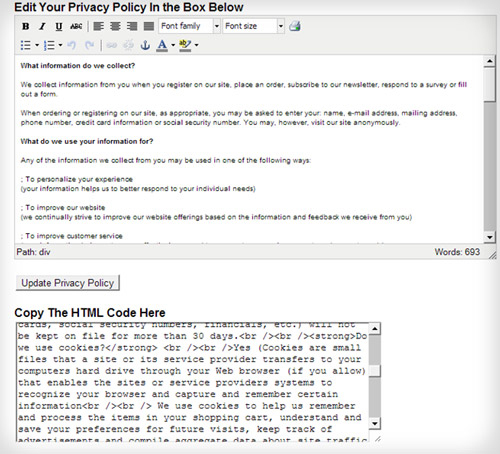
2: Shopify Policy Generator
Shopify Privacy Policy generator lets you create a generic Privacy Policy by simply filling out their form asking for your details.
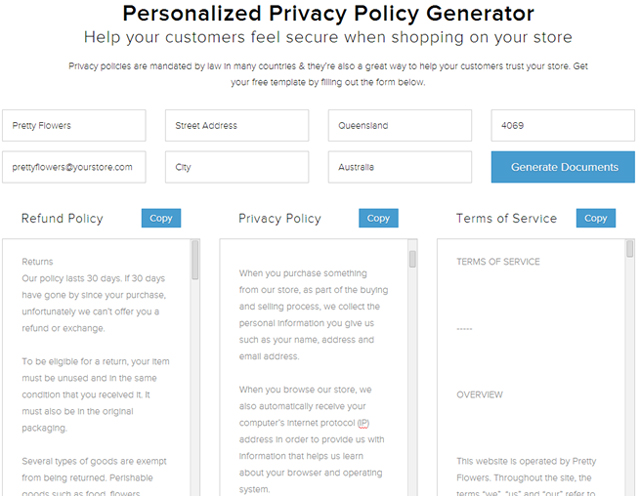
Once it’s done, it will automatically generate a Refund Policy, Privacy Policy and a Terms of Service templates for you as shown below.
3: Generate Privacy Policy

The PrivacyPolicies.com, previously known as Generate Privacy Policy, has friendly tools to create a professional looking Privacy Policy. It will also let you create a customized version specifically for your business needs.
How to use this tool?
- To start, type in the website address and name and click on “Generate My Privacy Policy” button.Then you simply need to fill out the form and enter your company details, what and how you handle the information that you gather from visitors
- Once you’re done with the form, you’ll be asked to enter your email and password to create an account for them, so they’ll be able to send you your customized Privacy Policy
- Then, you will be sent an email with the activation link. Once you log in, you will see your company’s name with your privacy policy listed
- You will have an HTML version (with codes) as well as the Plain text and hosted version so you can easily add it to your online store
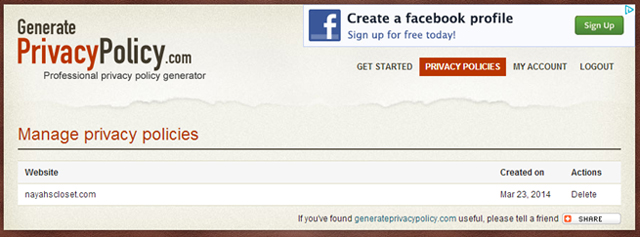
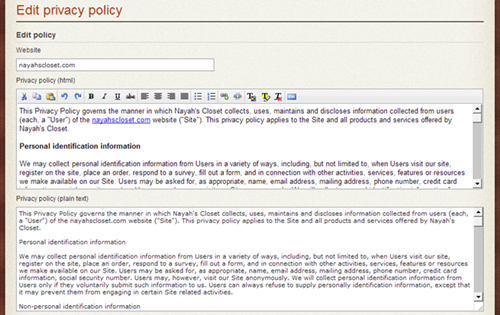
4: Cooley Privacy Policy Generator

Cooley GO Privacy Policy Generator lets you create a Privacy Policy in a few easy steps. You don’t need to think of all the necessary information to add as it is already provided as options through the steps.
How to use this tool?
- Simply click the “Next” button to create a simple US based privacy policy
- It will have a form for you to provide your company details and address. When you’re done, click on “Next”
- Proceed with the following instructions to provide the information that you collect from your visitors and customers, information that you collect from their computers, and how you intend to use that information
- Once you’re done with the form, you’ll receive your Privacy Policy in an email that includes an option to view your Privacy Policy, a draft in HTML format and a downloadable Word version
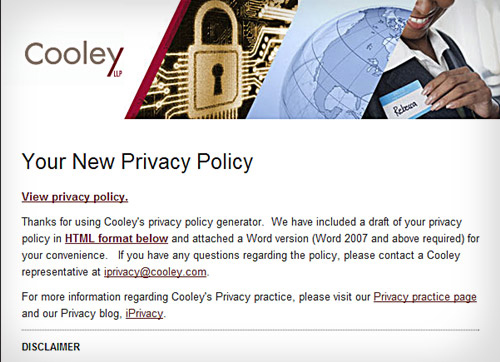
- Consult a lawyer before publishing your Privacy Policy online. Since this is considered a legal document, it’s always necessary to get advice from your attorney
- Update your Privacy Policy regularly and make sure to inform your visitors/customers of the update
- Place your Privacy Policy where visitors can easily find it
You see? It’s NOT that difficult, right? Especially when you know there are plenty of free tools to help you get started!
The Digital.com article The 12 Best Privacy Policy Generators Online provides you with more such tools. Check it out!
Furthermore, you can use Privacy Policy icons on your site. This will help visitors and customers to easily navigate the online store website and locate the Privacy Policy page. Let’s see how to find and use them.
Privacy Policy Icons
Make sure to use icons that are simple and can be easily identified. You can add these icons to the store Help pages so it will link to its Privacy Policy page.
You may check Privacy Policy icons online like htt
You may check Privacy Policy icons online like http://findicons.com/ and http://www.shutterstock.com/ or you may also ask an expert to create one that suits your employer’s needs and complements a particular online store.
Here are a few examples for an easier start.
Example 1
This is a Privacy Policy icon by Stuart Miles that you can download from here. It has size and format options to suit your preference.
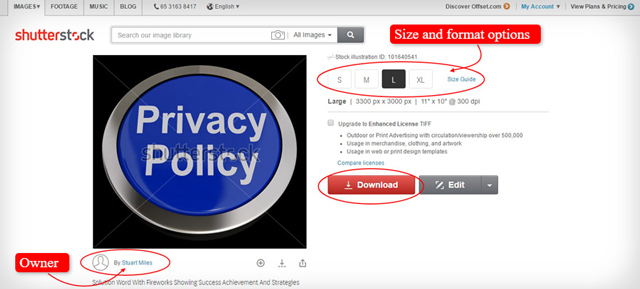
Example 2
Another icon was also made by Stuart Miles. You can download this directly from here.
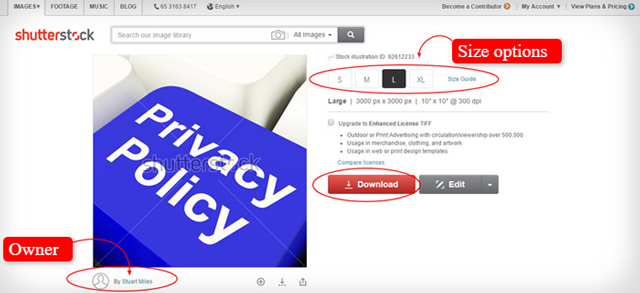
Example 3
There’s also a Privacy Policy icon that has a Creative Commons license designed by PICOL. You can download it from here.
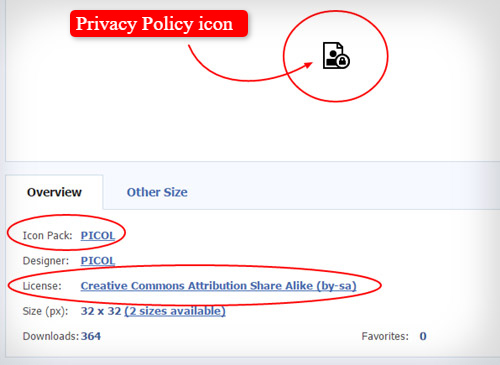
Example 4
Here’s another creative icon made by Curioso from Shutterstock. Download it here if you like and need it.
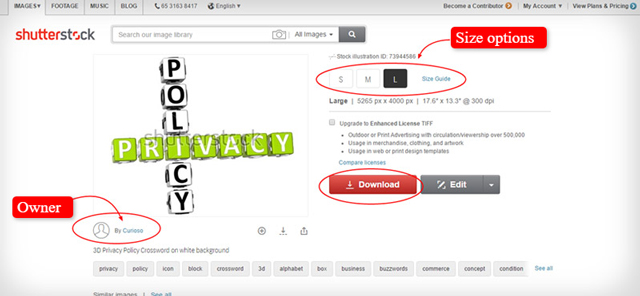
So far you’ve been equipped with the basic knowledge about creating a Privacy policy for an online store. Excellent!
However, there’s always some more knowledge you can gain if you’re curious and motivated enough, right? Exactly! Eager to always learn more?
That’s why we’ve compiled the further learning resources subsection for you. Enjoy yourselves!
Further Learning Resources
If you want to feel confident when creating a Privacy policy for your eCommerce employer, make sure you know everything they expect from you. So, you can always learn and find out more. Go ahead and good luck!
- eCommerce Privacy Policy
- Creating a Privacy Policy for eCommerce Stores
- Your First Privacy Policy? Start with These Clauses
- No Such Thing as a “Standard” Privacy Policy
- How to Create a Website Privacy Policy (sample included)
- 8 Reasons Why You Need a Privacy Policy
- You Need a Privacy Policy in 2018: Here’s How to Start
- 7 Considerations for Crafting an Online Privacy Policy
- Your eCommerce Business Needs A Website Privacy Policy
- 6 Steps to an Effective eCommerce Privacy Policy
- Does my company website need a privacy policy?
- Have a Website? You Need a Privacy Policy. Here’s Why
- Legal Requirements Regarding Privacy Policies + generator
- Privacy Policy Generator – free tool
- Privacy Policy Template
- Volusion Privacy Policy Generator – free tool
- Sample Privacy Policy
Great! Now you know exactly what you should consider when drafting a Privacy Policy for an online store and where to find some super helpful free tools. It’s only left to put our main learnings in a nutshell.
In Summary
A fantastic TechInAsia article on how to make sure an eCommerce business complies with privacy laws perfectly summarizes the main points from this lesson. So, take a closer look at the following lines written there.
A Privacy Policy is a legal document that describes how one party collects, uses, manages and discloses customer or user data.
Its purpose is to explain to the customer how their privacy and personal information will be protected.
The contents of any given Privacy Policy will depend on what country the person or company collecting the information is in, what country the users are in, what information is being collected, and what that information is used for.
The main principles that are enshrined in privacy laws around the world are:
- Give notice that you are collecting the data
- Obtain consent from your customers and users
- Collect the data for a reasonable and legitimate purpose
- Keep the data safe and secure
- Tell the user when you will disclose the data (if ever)
- Be accountable to your users and customers; and
- Provide access to the data and allow changes to be made
Your Privacy Policy should contain clauses covering the following:
- What data you will collect
- How you will protect and store data
- What you will do with the data
- In what circumstances will you release the data
- How your users can see what data you hold on them, and change or update it
- Dispute resolution
- Effective date; and
- Changes to the policy and where notices should be sent
You should also carefully think through what things you will use the data for, and decide whether those uses are reasonable given the circumstances in which you collect the data, and your relationship with your customers.
For your Privacy Policy to be enforceable, your customers need to have agreed to it. This means that the placement of your Privacy Policy on your e-commerce store is very important.
So, make sure to display your documents prominently.
Frequently Asked Questions
1. A Privacy Policy is a statement or a document included in online stores and other websites to give information about how the business owners collect and use the confidential and sensitive information they got from customers/visitors.
a. True
b. False
2. A Privacy Policy…
a. promotes transparency
b. helps online stores to win customers’ trust
c. accurately reflects a particular store’s intentions and enables customers to understand them
d. All of the above
3. What should be included in an online store Privacy Policy?
a. A brief statement of the store owner’s intention to protect and respect the privacy of information provided by their customers
b. A statement about what information the store collects from customers, how it is stored, shared and protected
c. A limitation of liability statement to set customers’ expectations on which situations or conditions are already beyond the store owner’s control
d. If possible, a credentials seal or privacy certification that can be obtained from a reputable company
e. All of the above and even more. The more detailed information, the more customers will be assured that their information is secured and protected
